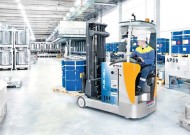 The first reach truck in Germany with a fuel cell drive is being tested at BASF Coatings AG in Münster. The other partners in the project are Hoppecke (fuel cell system developer and integrator), Linde Gas (hydrogen fuelling station) and the federal state of North Rhine-Westphalia, as part of the “progres.nrw” funding program
The first reach truck in Germany with a fuel cell drive is being tested at BASF Coatings AG in Münster. The other partners in the project are Hoppecke (fuel cell system developer and integrator), Linde Gas (hydrogen fuelling station) and the federal state of North Rhine-Westphalia, as part of the “progres.nrw” funding program
This means that two different trucks with the future oriented drive will be operating at BASF Coatings in an industrial application: A Still FM-X 20 reach truck and an R 60-25 electric truck. The FM-X 20 reach truck delivers finished goods for despatch at the BASF Coatings distribution centre and the R 60 moves manufacturing raw materials from the logistics warehouse to the production. The two trucks are refuelled at the hydrogen fuelling station built on the site.
With this project, Still is the first intralogistics company with experience in operating fuel cell driven tractors, electric fork lift trucks and reach trucks.
Hamburg based Still GmbH has been involved with fuel cells as an alternative to conventional batteries since 2003. Since then Still has been able to gather experience in various projects using this future oriented technology. HHLA Logistics have been operating a Still R 60-25 fuel cell truck in a test operation at the port of Hamburg since 2008 and since the end of 2006 two Still R 07-25 fuel cell tractors have been transporting baggage at Hamburg airport.
Hydrogen fuelling stations have also been erected at these locations,.
In principle it would also be possible to operate these trucks at locations producing hydrogen (H2) as a by-product. The supply of hydrogen to trucks operating in such areas (H2 clusters) would also benefit greatly from this.
Fuel cell technology will become economically interesting when the production costs for the fuel cell package drop further. Savings are also generated in multi-shift operation because no replacement traction batteries would need to be held.
The opportunities for fuel cell technology will increase with eco-friendly production of hydrogen. This is possible, for example, with solar technology which does not produce any CO2 emissions. In the face of the climate debate, fuel cell technology is therefore gaining weight.
In the long term, fuel cells could replace diesel and LPG engines to further reduce the production of CO2.
Which of the alternative drive technologies will win the race in the future is still an unanswered question. To answer it much more experience from tests is needed.
A further crucial factor is the development of the energy prices.
We see the development of fuel cell technology for materials handling vehicles as an important investment in a sustainable future.
Still GmbH




Comments are closed.